Using Search Terms Report to Optimise your Campaigns
A great way to optimise your Google Search Ads campaign is to regularly comb through your Search Terms report. To access it, click on ‘Keywords’ and then ‘Search Terms’.
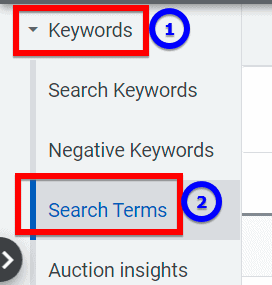
From here you can see the list of search queries that were input by users before seeing or clicking on your ads including the match types that triggered your ads and the ad group they fall into.
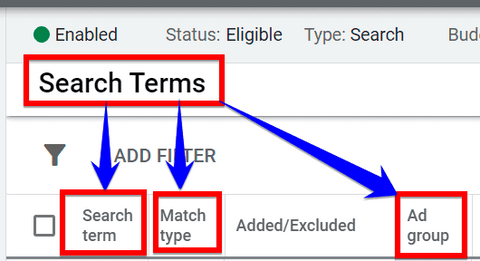
How do marketers benefit from this report? It can be used to see if the search queries are highly targeted and relevant; and to further optimise the keywords that trigger our ads!
Take note that we need to be clear about the difference between keywords and search terms. Keywords are what advertisers define and set a bid amount; whereas search terms are what searchers input in the search engine to see our ads.
Identify Negative Keywords
By going through the Search Terms report, you can identify keywords that are not offered by your business or not relevant. In this example where I am promoting SkillsFuture courses, I found this query where the searcher clicked on my ad!
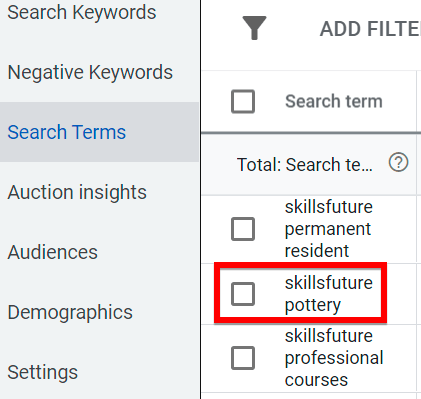
The search term that triggered my ad was ‘skillsfuture pottery’ and since I did not offer any pottery courses, this term should be added to my negative keyword list to ensure I do not spend money on clicks that cannot convert.
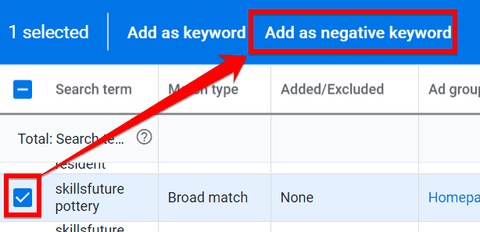
To negative it, simply select this search term then click on ‘Add as negative keyword’. You can add it to your campaign, ad group or negative keyword list depending on how you configure your campaign. It is a good practise to go through this report weekly and grow your negative keyword list.
Improve your Quality Score
When going through the report, we should look at both the 'Search term' and 'Ad group' columns and ensuring they both match. This can help in increased Quality Score resulting in better Ad Rank and lower cost-per-clicks.
Having a long list of negative keywords can help preserve your impressions, meaning your ad will not show for irrelevant searches. When you get less impressions for the same number of clicks, CTR will increase, which helps your Quality Score.
If you find a new search term that is receiving many clicks and impressions, you might want to consider moving it to a separate ad group with its own landing page.
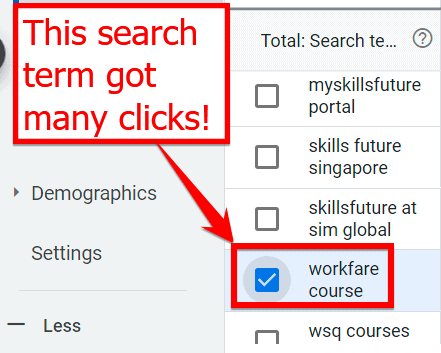
In my case, I noticed many searches for ‘workfare course’ where the searcher clicked on my ads. I can proceed to create a new ad group, add this as keyword and create a landing page optimised for ‘workfare courses’. This can lead to a higher click-through, better targeted keywords and landing page relevancy, which in turn can improve my Quality Score.
Discover New Keyword Opportunities
The Search Terms report can be a great tool to discover new keyword ideas that you never thought of.
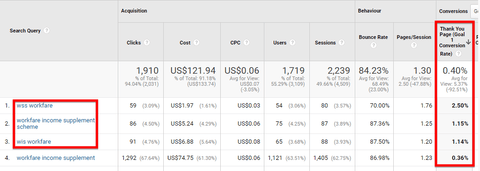
In my case, I discovered ‘workfare income supplement scheme’ – a new search term that led to conversions. As it is proven to convert, I can add this as a new keyword in my campaign. Additionally, the search terms that are driving conversions can be optimised as keywords in my SEO strategy.
Schedule to Receive Emails
You can choose to schedule email notifications about your Search Terms report, email now or download it.
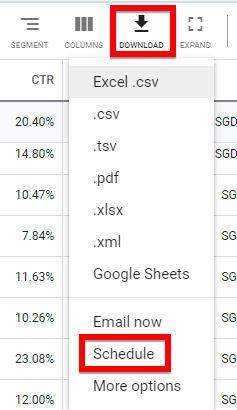
For busy marketers, scheduling weekly emails can help with your campaign optimisation.
In summary, regularly going through the Google Search Terms report and knowing what to look out for can help advertisers achieve a higher return on investment. Even with the announcement that Google will show fewer search terms in the report for insignificant searches, it is still carrying valuable data that advertisers cannot afford to miss out on!